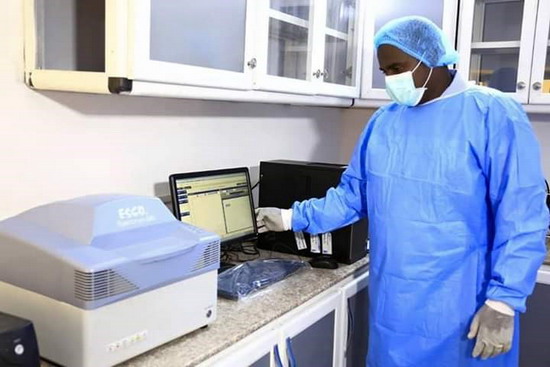
10 August 2020 – In every outbreak, early testing and detection are very important, they help give the appropriate diagnosis and ensure its containment and adequate monitoring while keeping the number of infections from rising. Laboratory-supported surveillance and testing allow early detection of cases and play a key role in early response and containment measures, such as isolation of cases and tracing of contacts.
In 1992, Darfur state authorities raised the idea of establishing a national laboratory in Nyala that would provide public health services and would serve to benefit all other Darfur states. Today, in the midst of the COVID-19 pandemic, with the restriction of movement, lockdown and banning of movement between states, all of these factors only further confirmed and emphasized the necessity of having a functioning laboratory to reduce dependency on the National Public Health Laboratory.
However, due to many reasons, mostly financial, lack of maintenance, trained staff and cessation of support by donors and at federal level, the laboratory has faced a number of challenges and difficulties over the years.
In 2012, WHO supported the Federal Ministry of Health in establishing a new laboratory for public health purposes to serve all Darfur states. WHO provided equipment, reagents, installation and training of staff through the National Public Health Laboratory in Khartoum. However, in 2014, all medical equipment previously set up were taken back and stored in Nyala Teaching Hospital from 2014 to 2019.
It was only In 2019, that WHO and the Centre for Disease Control decided to reestablish the laboratory in the Malaria Control Department in Nyala, all equipment were transferred to the newly designated location, the laboratory was then prepared and established through the State Ministry of Health and with the support of civil society, donors and volunteers.
In 2020, while facing the COVID-19 pandemic, the laboratory was not put to use immediately, as a matter of fact all equipment were present but not used. Samples were collected and sent to Khartoum to be tested in the National Public Health Laboratory to then be sent back, which was problematic as there were delays in testing and results which affected effective response. Consequently, this delay led to the decision of using the newly established laboratory in Nyala to accelerate the COVID-19 response. A team was sent by the Federal Ministry of Health from Khartoum to assess the readiness of the laboratory while a team from Nyala was sent to undergo training at the National Public Health Laboratory until it was decided that the laboratory was ready to function.
Mr Gafar Abdallah Ali, Director of the Centre for Disease Control in Darfur said, “Although we have faced many challenges and are still facing some, the recent establishment of the laboratory has helped considerably especially in the midst of the COVID-19 pandemic. Having been operational, the laboratory has helped us not only save considerable amounts of money in terms of relieving us from transportation costs related to samples having to be collected and then sent to Khartoum. It has mostly stopped testing delays and get timely results, improve testing quality and result accuracy, and therefore accelerated the COVID-19 response in all of the Darfur region. Today, the laboratory serves all of Darfur’s 5 states, covering around 13 million people, including refugees and internally displaced persons.
We are also looking forward to expanding and developing the laboratory capacity and not just limit it to simple routine testing, but also use it as a disease control and prevention centre and for research purposes. We believe that the laboratory could contribute to reducing the burden of diseases not only in the region of Darfur but in Sudan in general as we all know that Darfur is a region which shares many borders and therefore a growing influx of refugees and vulnerable populations.”
Today, samples are sent from all 5 states of Darfur and tested in a timely manner. So far, a total of 437 samples have been collected with 321 of which were negative. With the laboratory capacity being improved test results come back the same day which consequently saves time, enables better contact tracing which decreases propagation risks and in general accelerates the overall response.








